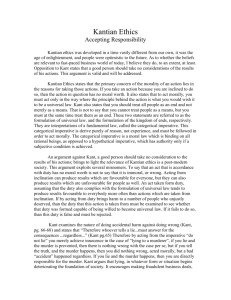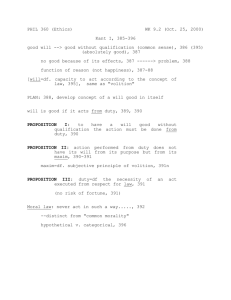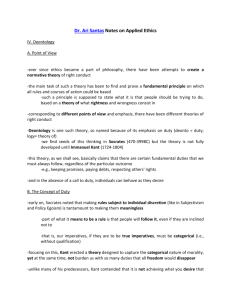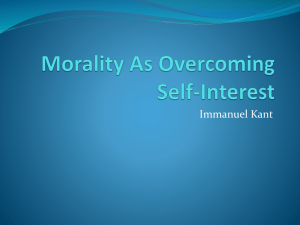Duty
advertisement
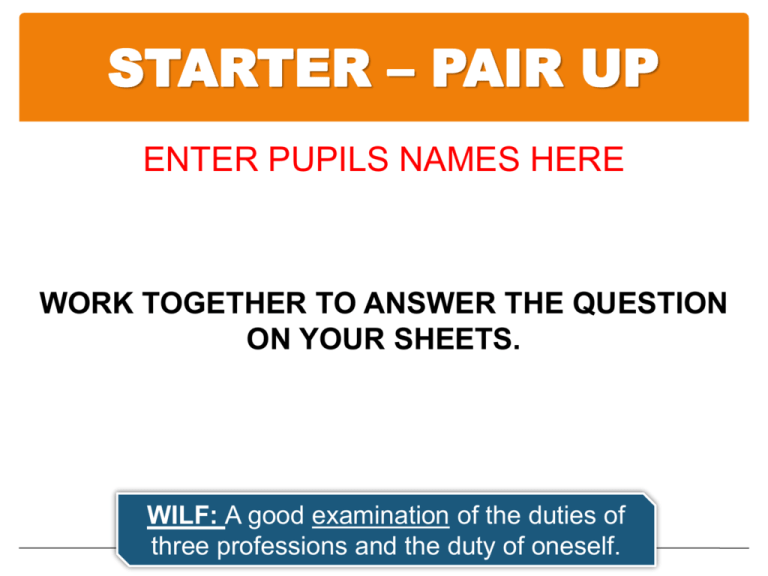
STARTER – PAIR UP ENTER PUPILS NAMES HERE WORK TOGETHER TO ANSWER THE QUESTION ON YOUR SHEETS. WILF: A good examination of the duties of three professions and the duty of oneself. Immanuel Kant WILF: A good examination of the duties of three professions and the duty of oneself. WILF: A written response to how we use reason to decide good and bad actions. WILF: A clear and concise presentation on Kant’s theory of duty. 1724-1804 WALT: 1. To explore Kant’s theory of duty. 2. To examine the implication of good will and reason on Kant’s theory of duty. Kantian Ethics: The Basics Kant’s Ethics A. Kant’s ethical theory can be described as B. C. D. E. F. deontological. Moral actions should be performed as a matter of duty. Humans are seeking an ultimate end called the supreme good (summum bonum). This cannot be achieved in this lifetime, humans must therefore be immortal. The existence of morality proves the existence of God. Moral law is known through reason and is independent of belief in God. The Basics Kant’s approach is Deontological. This means that for Kant, the right or wrongness of the action is in the action itself, and not in its consequences. Kant is a rationalist. He believes that reason is the means by which we can analyse the world. Kant sets out his ideas in his book “Grounding for the Metaphysics of Morals”, and discusses it further in his “Critique of Practical Reason” Reason Kant, along with other philosophers of the ‘enlightenment’, attaches great importance to man’s ability to reason A human being is essentially, a rational being, and it is this that constitutes his intrinsic dignity. Reason, says Kant, is an innate, intellectual power existing more or less equally in all men, it enables the individual to resolve problems in a way, more or less acceptable to everyone. If reason is universal, the moral commands generated by reason will be universal and applicable to all men. The Good Will Write down 10 possible reasons for the younger person’s actions in the picture. Put a tick or a cross to indicate which were good or bad reasons. Consider whether the action was good or bad –what are you using to formulate your judgement? The Good Will In the search for intrinsic ‘good’, Kant did not believe that any outcome was inherently good. Pleasure or happiness could result out of the most evil acts. He also did not believe in ‘good’ character traits, as ingenuity, intelligence, courage etc. could all be used for evil. In fact, he used the term good to describe the ‘good will’, by which he meant the resolve to act purely in accordance with one’s duty. He believed that, using reason, an individual could work out what one’s duty was. Kant wanted to put GOOD WILL at the very centre of ethics GOOD WILL +DUTY = A MORAL ACTION This is the opposite of Hume's argument that morality is only based in making people happy and fulfilling their desires. Duty The only thing, Kant says, which is good in and of itself is what he calls a Good Will. The Good Will is a sense of duty we have to do the right thing. He believed that “all rational beings” have the duty to behave morally. KANT REASON Good will Duty Moral Principles THE QUESTIONER THE SUMMARISER Ask questions which will help Tell the group what you have the group to understand what has been read. Thinks of questions to ask as they read the text. read in your own words. Only tell the important information, not the little details. Keep it as short as you can! It is a reminder of what has been read so far. THE PREDICTOR Use what you have read or clues from the illustrations to help figure out what the group will learn or what will happen in the text. You can change your predictions as you read on! THE CLARIFER You must clarify whenever you: Read a word you don’t understand. Find that sentence doesn’t make sense. Are confused by what you have read. In The Boardroom . . . Pitch your Ideas WILF: A clear and concise presentation on Kant’s theory of duty. The task: You will split into 2 groups. You must clearly present Kant’s theory of duty. Use pages 39-41 Be as creative as you like for presenting your ideas in the boardroom. Everyone is expected to speak. “It is impossible to conceive of anything at You will be judged on how all in the world, or even out of it, which can well you work as a group, how well you pitch, and how be taken as good without qualification, clear your presentations except a good will.” (Groundwork for the are. Metaphysics of Moral) http://www.youtube.com/watch?v=i0kWvf6wJyw What does the word deontological mean? How does Kant know what his duty is? What role does good will play in Kant’s theory of duty? Numbered Heads Together How do we use reason to decide good and bad actions? What does Kant use to determine moral principles? What does absolute mean? HOMEWORK Find out the definitions of the essential terminology. Use page 36 in the OCR Religious Ethics for AS and A2 textbook for a list of the key terminology.

